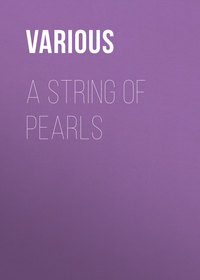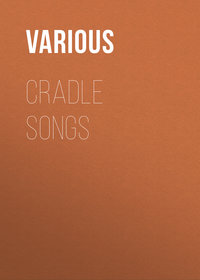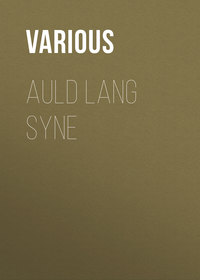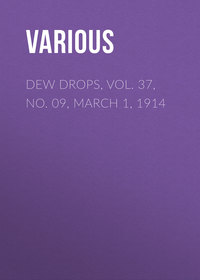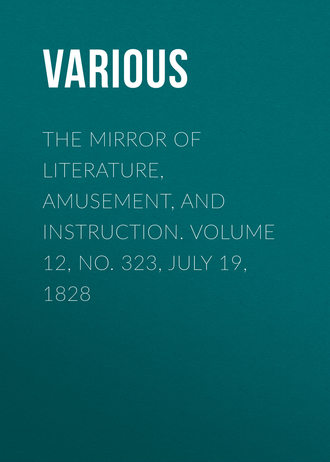
The Mirror of Literature, Amusement, and Instruction. Volume 12, No. 323, July 19, 1828
The unknown, thus addressed, made the slightest possible inclination towards me; and then, in an under tone, “I believe, sir, your name is D–?”
I paused; a vague sort of recollection came over me. Could it be?—no, surely not! And yet the voice—the manner—the—the—
My suspicions were soon converted into certainty, when the stranger, with his own peculiar expression, quietly broke forth a second time with, “Touching that little account—”
This was enough; it was more than enough—it was vexatiously superfluous. To be dunned for a debt, at the very time when the nerves could best dispense with the application; to be recalled back to the vulgarities of existence, at that precise moment when the imagination was most abstracted from all commercial common-places; to be stopped by a tailor, (and such a tailor!) when the mind was dreaming of a mistress—the bare idea was intolerable! So I thought; and, without further explanation, hurried precipitately from the spot, nor ever once paused till far removed from the husky tones of that sepulchral voice which had once before so highly excited my annoyance.
[The narrater then visits one of Mr. Champagne Wright’s masquerades, where he falls in love with a fresco nun. He receives a billet.]
I stood like one bewildered; but, soon recovering my self-possession, moved direct towards the chandelier, with a view to peruse an epistle expressive of woman’s fondest love. As with glistening eyes I proceeded to tear open the billet, a flood of transporting thoughts swept over me. I fancied that I was on the eve of acquaintance with –; but, judge my astonishment, when, instead of the expected document, the key to such transporting bliss, I read, engraved in large German text, on a dirty square card, embossed at the edge with flowers, the revolting, business-like address of
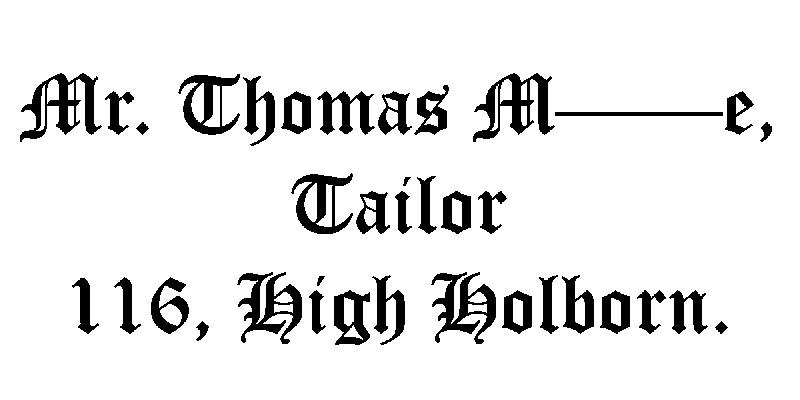
It so happened that, the next day, I dined with C–. Of course the masquerade, and with that the tailor, were the first topics of conversation between us. Both allowed that the circumstances respecting his late appearance were uncommon; but there, with my friend, the matter ended: with me it was a more enduring subject for reflection; and, after a night kept up till a late hour over a bowl of C–’s most faultless punch, I set out, moody and apprehensive, to my humble abode. By this time it was past three o’clock; the streets were nearly all deserted. —While thoughtfully plodding onwards, a sudden noise from the Holborn end of Drury-lane took my attention; it evidently proceeded from a row—a systematic, scientific row; and, indeed, as I drew near the scene of action, I could distinctly hear the watchman’s oaths blending in deep chorus with the treble of some dozen or two valorous exquisites.
I felt certain rising abstract ideas of pugnacity, and conceived myself bound to indulge them on the first head and shoulders I should meet. This spirit brought me at once into the thick of the fight, and, before I was well aware of my proximity, I found myself fast anchored alongside a veteran watchman, with a pigtail and half a nose. The conflict now commenced in good earnest; there were few or no attempts at favouritism; the blows of one friend told equally well on the scull of another; watchman assaulted watchman with a zeal respectable for its sincerity; and, indeed, had these last been any thing more than a bundle of old coats and oaths, they would most undoubtedly have drubbed each other into a better world. After a lively and well-sustained affair of about twenty minutes, a squadron of auxiliary watchmen arrived, and, with some difficulty, deposited us all safely in the watch-house. And here the very first person that met my gaze—seated, with due regard to dignity, in an arm-chair, a pair of spectacles on his nose, a glass of brandy-and-water by his side, and a newspaper, redolent of cheese, before him—was the constable of the night—the nun of the masquerade—the Mysterious Tailor of High Holborn! The wretch’s eyes gleamed with a savage but subdued joy at the recognition; a low, chuckling laugh escaped him; while his dull countenance, made doubly revolting by the dim light of the watch-house, fell, fixed and scowling, upon me, as he pointed towards the spot where I stood.—“Dobson,” he exclaimed; and, at the word, forth stepped the owner of this melodious appellative, with “this here man.” —Luckily, before he could finish his charge, a five-shilling-piece, which I thrust into his unsuspecting palm, created a diversion among the watchmen in my behalf; under favour of which, while my arch enemy was adjusting his books, I contrived to escape from his detested presence.
It happened that about a month subsequent to this last rencontre, circumstances led me to Bologne, whither I arrived, late in the evening, by the steamboat. On being directed to the best English hotel in that truly social Anglo-Gallic little town, I chanced to find in the coffee-room an old crony, whom I had known years since at Cambridge, and who had just arrived from Switzerland, on a speculation connected with some vineyards.
I had a thousand questions to ask my friend, a thousand memories to disinter from their graves in my heart, past follies to re-enact, past scenes to re-people. We began with our school-days, pursued the subject to Cambridge, carried it back again to Reading, and thence traced it through all its windings, now in sunshine, now in gloom, till the canvass of our recollection was fairly filled with portraits. In this way, time, unperceived, slipped on; noon deepened into evening, evening blackened into midnight, yet nothing but our wine was exhausted.
At last, after a long evening spent in the freest and most social converse, my friend quitted the coffee-room, while I—imitating, as I went, the circumlocutory windings of the Meander—proceeded to my allotted chamber. Unfortunately, on reaching the head of the first staircase, where two opposite doors presented themselves, I opened (as a matter of course) the wrong one, which led me into a spacious apartment, in which were placed two fat, full-grown beds. My lantern happening to go out at the moment, I was compelled to forego all further scrutiny, so without more ado, flung off my clothes, and dived, at one dexterous plunge, right into the centre of the nearest vacant bed. In an instant I was fast asleep; my imagination, oppressed with the day’s events, had become fairly exhausted, and I now lay chained down in that heavy, dreamless sleep, which none but fatigued travellers can appreciate. Towards daybreak, I was roused by a peculiar long-drawn snore, proceeding from the next bed. The music, though deep, was gusty, vulgar, and ludicrous, like a west wind whistling through a wash-house. I should know it among a thousand snores. At first I took no notice of this diversified sternutation, but as it deepened every moment in energy, terminating in something like a groan, I was compelled to pay it the homage of my admiration and astonishment. This attention, however, soon flagged; in a few minutes I was a second time asleep, nor did I again awake till the morning was far advanced. At this eventful juncture, while casting my eyes round the room with all the voluptuous indolence of a jaded traveller, they suddenly chanced to fall on a gaunt, spectral figure, undressed, unwashed, unshaved, decked out in a red worsted night-cap, its left cheek swollen, as if with cold or tooth-ache, and seated bolt upright in the very next bed, scarce six inches off my nose. And this figure was–but I need add no more; the reader must by this time have fully anticipated my discovery.
That night I started from Bologne. I could no more have endured to stop there, conscious that the town contained my persecutor, than I could have flown. Accordingly, after a hurried breakfast, I proceeded to arrange what little business I had to transact; and this completed, away I posted to the well-known shop of Monsieur –, dentist, perruquier, and general agent to the steam-packet company. Fortunately the little man was at home, and received me with his usual courtesy. He was very, very sorry that he could not stay to converse with me, but a patient in the inner parlour required his immediate attendance; he must therefore—. I entreated him not to apologize; my business was simple—it was merely to ascertain at what hour the first packet sailed; and having so said, and received a satisfactory reply, I prepared to quit the shop, when just as I was turning round to shut the door, I caught a glimpse through the half-closed curtains that shaded the inner room of a cheek and one eye. The cheek was swollen, and a solitary patch of snuff rested, like a fly, upon its surface. It was the Mysterious Tailor; he had come in to have his tooth pulled out.
Notwithstanding my anxiety to quit Bologne, it was evening before I was on board the packet; nor did I feel myself at ease, until the heights had dwindled to a speck, and the loud carols of the fishermen returning home from their day’s sport, had sunk into a faint, undistinguished whisper. Our vessel’s course for the first hour or so was delightful. Towards night, the weather, which had hitherto proved so serene, began to fluctuate; the wind shifted, and gradually a heavy swell came rolling in from the north-east towards us. As the hour advanced, a storm seemed advancing with it; and a hundred symptoms appeared, the least of which was fully sufficient to certify the coming on of a tremendous hurricane. Our captain, however—a bronzed, pinched-up little fellow, whom a series of north-westers seemed to have dried to a mummy—put a good face on the matter, and our mate whistled bluffly, though I could not help fancying that his whistle had something forced about it.
We had by this time been tossing about upwards of four hours, yet despite the storm, which increased every moment in energy, our vessel bore up well, labouring and pitching frightfully to be sure, but as yet uninjured in sail, mast, or hull. As for her course, it was—so the mate assured me—“ a moral impossible to say which way we were bound, whether for a trip to Spain, Holland, or Van Dieman’s Land; it might be one, it might be t’other.” Scarcely had he uttered these words, when a long rolling sea came sweeping on in hungry grandeur towards us, and at one rush tore open the ship’s gun-wale, which now, completely at the mercy of the wave, went staggering, drunken, and blindfold, through the surge. From this fatal moment the sailors were kept constantly at the pumps, although so instantaneous was the rush of water into the hold, that they did little or no good; there seemed, in fact, not the ghost of a chance left us; even the mate had ceased whistling, and the captain’s oaths began to assume the nature of a compromise between penitence and hardihood.
It was now midnight, deep, awful midnight; the few remaining passengers had left the deck and retreated into a bed which they shared in common with the salt water. The Captain stood, like one bewildered, beside the helm, while I lay stretched along the forecastle, watching, as well as I could, the tremendous rushing of the waves. It was during a partial hush of the storm, when the wind, as if out of breath, was still, that a shifting light attached to some moving body, came bearing down full upon us.
“This is an ugly night, sir,” said the Captain, who now, for the first time, found words, “yet methinks I see a sail a-head.”
“Surely not,” I replied, “no earthly vessel but our own can live on such a sea.”
Scarcely had the words escaped me, when “helm a lee!” was roared out in a loud emphatic tone, something between rage and fright.
The captain strove to turn his helm, but in vain, the rudder had lost all power. At this instant, a rushing sound swept past us, and the two ships came in direct contact with each other. The crash was tremendous: down with a dizzy spinning motion went the strange vessel; one yell—but one shrill piercing yell, which is ever sounding in my ears, ensued—a pause, and all was over.
My heart died within me at that cry; an icy shudder crept through me, every hair of my head seemed endowed with separate vitality. To go down into the tomb—and such a tomb!—unwept, unknown, the very lights from the English coast still discernible in distance, yet not a friend to hold forth aid; the idea was inexpressibly awful. Just at this crisis, while grasping the bannister with weak hands, I lay faint and hopeless on the deck, I fancied I saw a dark figure crawling up the cabin-steps towards me. I listened; the sound drew near, the form advanced, already it touched that part of the staircase to which I clung. Was it the phantom of one of those wretches who had just met death? Had it come fresh from eternity, the taint of recent earth yet hanging about it, to warn me of my own departure? A sudden vivid flash enabled me to dispel all doubt; the dull, grey eye, and thin furrowed form, were not to be so mistaken; the voice too—but why prolong the mystery? it was my old unforgotten persecutor, the Mysterious Tailor of High Holborn. What followed I know not: overpowered by previous excitement, and the visitation of this infernal phantom, my brain spun round—my heart ticked audibly like a clock—my tongue glued to my mouth—I sank senseless at the cabin door.
(To be concluded in our next.)SPIRIT OF THE PUBLIC JOURNALS
NORFOLK PUNCH
AN INCANTATIONTwenty quarts of real Nantz,Eau-de-vie of southern France;By Arabia’s chemic skill,Sublimed, condensed, in trickling still;’Tis the grape’s abstracted soul,And the first matter of the bowl.Oranges, with skins of gold,Like Hesperian fruit of old,Whose golden shadow wont to quiverIn the stream of Guadalquiver,Glowing, waving as they hungMid fragrant blossoms ever young,In gardens of romantic Spain,—Lovely land, and rich in vain!Blest by nature’s bounteous hand,Cursed with priests and Ferdinand!Lemons, pale as Melancholy,Or yellow russets, wan and holy.Be their number twice fifteen,Mystic number, well I ween,As all must know, who aught can tellOf sacred lore or glamour spell;Strip them of their gaudy hides,Saffron garb of Pagan brides,And like the Argonauts of Greece,Treasure up their Golden Fleece.Then, as doctors wise preserveThings from nature’s course that swerve,Insects of portentous shape—worms,Wreathed serpents, asps, and tape-worms,Ill-fashion’d fishes, dead and swimming,And untimely fruits of women;All the thirty skins infuseIn Alcohol’s Phlogistic dews.Steep them—till the blessed SunThrough half his mighty round hath run—Hours twelve—the time exactTheir inmost virtues to extract.Lest the potion should be heady,As Circe’s cup, or gin of Deady,Water from the crystal spring.Thirty quarterns, draw and bring;Let it, after ebullition,Cool to natural condition.Add, of powder saccharine,Pounds thrice five, twice superfine;Mingle sweetest orange blood,And the lemon’s acid flood;Mingle well, and blend the wholeWith the spicy Alcohol.Strain the mixture, strain it wellThrough such vessel, as in HellWicked maids, with vain endeavour,Toil to fill, and toil for ever.Nine-and-forty Danaides,Wedded maids, and virgin brides,(So blind Gentiles did believe,)Toil to fill a faithless sieve;Thirsty thing, with naught content,Thriftless and incontinent.Then, to hold the rich infusion,Have a barrel, not a huge one,But clean and pure from spot or taint,Pure as any female saint—That within its tight-hoop’d gyreHas kept Jamaica’s liquid fire;Or luscious Oriental rack,Or the strong glory of Cognac,Whose perfume far outscents the Civet,And all but rivals rare Glenlivet.To make the compound soft as silk,Quarterns twain of tepid milk,Fit for babies, and such small game,Diffuse through all the strong amalgame.The fiery souls of heroes so doCombine the suaviter in modo,Bold as an eagle, meek as Dodo.Stir it round, and round, and round,Stow it safely under ground,Bung’d as close as an intentionWhich we are afraid to mention;Seven days six times let pass,Then pour it into hollow glass;Be the vials clean and dry,Corks as sound as chastity;—Years shall not impair the meritOf the lively, gentle spirit.Babylon’s Sardanapalus,Rome’s youngster Heliogabalus,Or that empurpled paunch, Vitellius,So famed for appetite rebellious—Ne’er, in all their vastly reign,Such a bowl as this could drain.Hark, the shade of old ApiciusHeaves his head, and cries—Delicious!Mad of its flavour and its strength—hePronounces it the real Nepenthe.’Tis the Punch, so clear and bland,Named of Norfolk’s fertile land,Land of Turkeys, land of Coke,Who late assumed the nuptial yoke—Like his county beverage,Growing brisk and stout with age.Joy I wish—although a Tory—To a Whig, so gay and hoary—May he, to his latest hour,Flourish in his bridal bower—Find wedded love no Poet’s fiction,And Punch the only contradiction.Blackwood’s Magazine.
NOTES OF A READER
Two French officers resident at Kermanshaw, lately quarrelled; a challenge ensued; but a reconciliation was effected; when the incident drew forth the following natural and affecting remark from a native:—“How foolish it is for a man who wishes to kill his enemy, to expose his own life, when he can accomplish his purpose with so much greater safety, by shooting at him from behind a rock.”
SPINNING VIRTUEA young preacher, who chose to enlarge to a country congregation on the beauty of virtue, was surprised to be informed of an old woman, who expressed herself highly pleased with his sermon, that her daughter was the most virtuous woman in the parish, for “that week she had spun sax spyndles of yarn.”—Sir W. Scott.
AT LINCOLNThere is a beautiful painted window, which was made by an apprentice, out of the pieces of glass which had been rejected by his master. It is so far superior to every other in the church, that, according to the tradition, the vanquished artist killed himself from mortification.
A great lawyer in the sister kingdom, when asked by the viceroy, what Captain Keppel meant by his “Personal Travels in India, &c.” replied, that lawyers were wont to use this word in contradistinction to “Real.”
It is said that the intestines of the Carolina parrot are an instantaneous poison to cats.
CHINESE DUNNINGWhen a debtor refuses payment in China, the creditor, as a last resource, threatens to carry off the door of his house on the first day of the year. This is accounted the greatest misfortune that could happen, as in that case there would be no obstruction to the entrance of evil genii. To avoid this consummation, a debtor not unfrequently sets fire to his house on the last night of the year.
During the times of Catholicism in Scotland, Fishing was prohibited from the Sabbath after vespers, till Monday after sunrise. This was termed Setterday’s Slopp.
THE TOWER OF BABEL,says a recent traveller in the east, now presents the appearance of a large mound or hill, with a castle on the top, in mounting to which, the traveller now and then discovers, through the light sandy soil, that he is treading on a vast heap of bricks. The total circumference of the ruin is 2,286 feet, though the building itself was only 2,000, allowing 500 to the stadia, which Herodotus assigns as the side of its square. The elevation of the west side is 198 feet. What seems to be a castle at a distance, when examined, proves to be a solid mass of kiln-burnt bricks, 37 feet high, and 28 broad.
SPANISH LITERATUREThe Spaniards are particularly averse to borrowing from the intellectual treasures of other nations. They glean the field of their own muses to the very last ear, and then commence the same labour over again.
EVERY MAN HIS OWN LAWYERHere is a well-turned reply to plaintiff’s counsel, available in all suits and times. It occurred in the trial of Lord Danby, in the time of Charles II. “If the gentleman were as just to produce all he knows for me, as he hath been malicious to show what may be liable to misconstruction against me, no man could vindicate me more than myself.”
In modern education there is a lamentable lack of veneration for the great masters of English literature. Spenser, Milton, and Dryden are altogether less familiar to the present generation than they were to that which preceded it. “We will not say that our Shakspeare is neglected, for his age is ever fresh and green, and he comes reflected back to us from a thousand sources, whether in the tranquillity of home, the turbulent life of capitals, or the solitude of travel through distant lands.”—Edin. Rev.
RISE AND FALLWhat an idea of the dismantling of our nature do the few words which Roper, Sir Thomas More’s son-in-law, relates, convey! He had seen Henry VIII. walking round the chancellor’s garden at Chelsea, with his arm round his neck; he could not help congratulating him on being the object of so much kindness. “I thank our lord, I find his grace my very good lord indeed; and I believe he doth as singularly favour me as any subject in his realm. However, son Roper, I may tell thee, I have no cause to be proud thereof, for if my head would win a castle in France, it would not fail to be struck off.”—Edinburgh Review.
There is not only room, but use, for all that God has made in his wisdom—a use not the less real, because not always tangible, or immediate.—Ibid.
Nicholas Brady, (the coadjutor of Tate, in arranging the New Version of Psalms,) published a translation of the Æneid of Virgil, which (says Johnson,) when dragged into the world, did not live long enough to cry.
Blue appears to be the most important of all colours in the gradations of society. A licensed beggar in Scotland, called a bedesmen, is so privileged on receiving a blue gown. Pliny informs us that blue was the colour in which the Gauls clothed their slaves; and blue coats, for many ages, were the liveries of servants, apprentices, and even of younger brothers, as now of the Blue Coat Boys, and of other Blue Schools in the country. Women used to do penance in blue gowns. Is it not unseemly that blue which has hitherto been the colour of so many unenviable distinctions, should be the adopted emblem of liberty—English True Blue!
SONG
By JOANNA BAILLIEThe gliding fish that takes his playIn shady nook of streamlet cool,Thinks not how waters pass away,And summer dries the pool.The bird beneath his leafy domeWho trills his carol, loud and clear,Thinks not how soon his verdant homeThe lightning’s breath may sear.Shall I within my bridegroom’s bowerWith braids of budding roses twined,Look forward to a coming hourWhen he may prove unkind?The bee reigns in his waxen cell,The chieftain in his stately hold,To-morrow’s earthquake,—who can tell?May both in ruin fold.The Gatherer
“A snapper-up of unconsidered trifles.”—Shakspeare.CATS (again.)Charles James Fox walking up Bond-street from one of the club-houses with an illustrious personage, laid him a wager, that he would see more cats than the prince in his walk, and that he might take which side of the street he liked. When they got to the top, it was found that Mr. Fox had seen thirteen cats, and the prince not one. The royal personage asked for an explanation of this apparent miracle; Mr. Fox said, “Your royal highness took, of course, the shady side of the way, as most agreeable; I knew that the sunny side would be left for me, and cats always prefer the sunshine.”
VAUXHALL WEATHERIt having happened for several successive summers, that wet weather took place just as the Vauxhall season commenced, Tom Lowe, Tyers’s principal vocal performer, accidentally meeting the proprietor, expressed an anxious desire to know when he meant to open his gardens. “Why are you so particular, Mr. Lowe?” said Jonathan. “I have a very good reason, sir, and should like to know the very day.” “Why, why?” reiterated Tyers, impatiently. “That I may bespeak a great coat to sing in; for you know we shall be sure to have rain.”"
LAME SINGINGA few days since, a musicsellers’s boy was sent to the publisher’s for a number of copies of the song “I’d be a Butterfly, arranged for two trebles;” when, on being desired to repeat his order, he replied, “I’d be a Butterfly, arranged for two cripples.”
LAUGHTERDemocritus, who was always laughing, lived one hundred and nine years; Heraclitus, who never ceased crying, only sixty. Laughing then is best; and to laugh at one another is perfectly justifiable, since we are told that the gods themselves, though they made us as they pleased, cannot help laughing at us.



